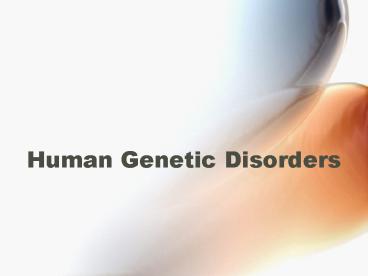Human Genetic Disorders - PowerPoint PPT Presentation
1 / 12
Title:
Human Genetic Disorders
Description:
How would this information help you determine whether the baby will have hemophilia? Human Genetic Disorders Genetic Disorder An abnormal condition that a person ... – PowerPoint PPT presentation
Number of Views:225
Avg rating:3.0/5.0
Title: Human Genetic Disorders
1
Human Genetic Disorders
2
Genetic Disorder
- An abnormal condition that a person inherits
through genes or chromosomes. - Caused by mutations, or changes in a persons DNA
- May occur during meiosis or may also have been
already present in the parents cells
3
Cystic Fibrosis
Chromosome 7
CFTR gene
The most common allele that causes cystic
fibrosis is missing 3 DNA bases. As a result,
the amino acid phenylalanine is missing from the
CFTR protein.
Normal CFTR is a chloride ion channel in cell
membranes. Abnormal CFTR cannot be transported
to the cell membrane.
The cells in the persons airways are unable to
transport chloride ions. As a result, the airways
become clogged with a thick mucus.
4
Cystic Fibrosis Prognosis
- Not sex-linked
- No cure
- Drugs to prevent infection
- Physical therapy to break up mucus in lungs
5
Sickle-Cell Anemia
- Genetic disorder that causes the production of
abnormal hemoglobin. - Hemoglobin is a protein in RBCs that carriers
oxygen. - Sickle-shape often blocks blood vessels resulting
in lack of oxygen.
6
Genetics Behind Sickle-Cell
- 9 of African Americans carry the sickle-cell
allele - Sickle-cell allele is codominant with normal
allele - Leads to resistance to malaria
- 2 Sickle-cell alleles results in sickle-cell
symptoms
7
Hemophilia
- Genetic disorder in which a persons blood clots
very slowly or not at all. - Individuals can bleed to death from a minor cut
or scrape. - Caused by recessive allele on the X chromosome.
- Treatment
- Receive doses of missing clotting protein
- Can lead relatively normal lives
8
Down Syndrome
- Every cell has an extra copy of chromosome 21.
- Result of error during meiosis
- Distinctive physical appearance and some degree
of mental retardation - Many lead full, active lives.
9
Tools in Diagnosing Genetic Disorders
- Amniocentesis
- Very long needle used to remove small amount of
fluid that surrounds the baby - Fluid contains cells from the baby
- Karyotype
- Picture of all the chromosomes in a cell
- Can reveal whether a developing baby has the
correct number of chromosomes in its cells and
whether it is a boy or girl.
10
Genetic Counseling
- Helps couples understand their changes of having
a child with a particular genetic disorder. - Uses karyotypes, pedigree charts, and Punnett
squares to determine if parents are carriers,
etc.
11
Summary Questions
- Explain how genetic disorders occur in humans.
Give two examples of genetic disorders. - Describe two tools that doctors use to detect
genetic disorders. - How do the cells of people with Down syndrome
differ from those of others? How might this
difference arise?
12
Summary Questions
- A couple with a family history of hemophilia is
about to have a baby girl. - What information about the parents would you want
to know? - How would this information help you determine
whether the baby will have hemophilia?

